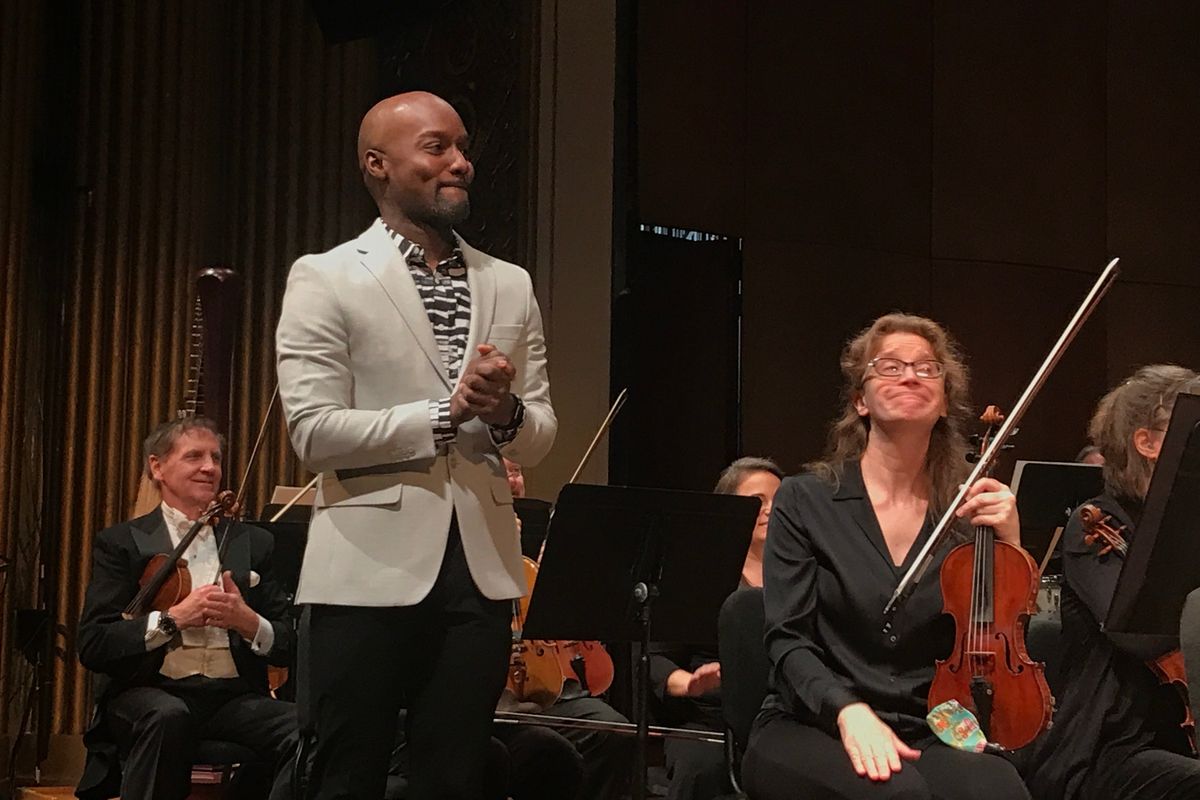Concert review: Spokane Symphony, chorale, bring ‘A Taste of Freedom’ into the world with a bang

Music directors and conductors, such as our James Lowe, customarily try to plan a program to end with a bang. In this weekend’s pair of concerts by the Spokane Symphony, Lowe chose to begin with one: the world premiere of an inspiring new work for chorus and orchestra, “A Taste of Freedom,” written by Haitian-American composer Sydney Guillaume and commissioned by the orchestra, Eastern Washington University Africana Studies and Ron and Sue Runyon.
The commission was first proposed by EWU professor Kristina Ploeger-Hekmatpanah, former director of the Spokane Symphony Chorale, and so it was fitting that the rear of the stage at the Martin Woldson Theater at the Fox was filled by that splendid group, led by its current director, Meg Stohlmann.
Pursuing the celebration of diversity and inclusiveness which animates “A Taste of Freedom,” the remainder of the program was comprised of Samuel Barber’s Violin Concerto, in which concertmaster Mateusz Wolski appeared as soloist, “From a Moonlit Ceremony” by George Frederick McKay, and William Grant Still’s “Afro-American Symphony” of 1930.
“A Taste of Freedom” is a free-form setting of a poem of 12 stanzas written by Guillaume’s colleague, Lloyd Reshard, a distinguished vocal soloist. The poem takes the contributions made to the American diet by African and other cultures as symbolic of the richness and diversity of American life, and its foundation in the principle of individual liberty.
Although it lasts not more than 10 minutes, the work gives ample evidence of its composer’s abundant gifts as a melodist, a master of choral writing and an orchestrator. The chorus begins with a lovely, sinuous melody that winds its way through the piece like a river growing in power and complexity. Through all these changes, Guillaume maintains a steady, constant pulse to convey the poem’s accumulation of power as it moves toward its climax: “All knead the dough of Liberty / to boil or rise or bake. / Whatever then we offer up / a nation we will make.”
As the work progresses, it makes increasingly greater demands on the chorus for variety and subtlety of declamation. Guillaume asks them to make the same sudden and precise changes in color and dynamics that Schubert asks of his solo singers in order to highlight the meaning of the text. It was amazing to hear 80 people render these changes so exactly and with such naturalness.
The orchestra, too, was required to interact with the chorus at precisely the right point in the text, and did so with the apparent ease that suggests years, rather than mere hours, of familiarity with the piece. This was a memorable demonstration of professionalism.
The performance by Wolski and his colleagues of the Spokane Symphony of Samuel Barber’s Violin Concerto Op. 14 from 1939 was of the sort many music lovers get to hear only in their dreams. So fresh and spontaneous was Wolski’s playing, so apparently limitless his range of color and expression, that he seemed to be improvising.
The same might be said of the orchestra, whose playing one would insult by describing it as “accompaniment.” Their playing matched Wolski’s so precisely in tone, color and tempo that at many points the very act of producing sound seemed to disappear, leaving only a veil of audible emotions. They were the emotions, of course, that Barber wished us to experience, of a yearning nostalgia for peace and tranquility shadowed ominously by premonitions of impending violence.
In composing the four-movement suite, “From a Moonlit Ceremony” (1945), McKay employed melodies and rhythms he had noted down during a visit to a group from the Muckleshoot tribe in Auburn. McKay, who was born in Harrington and raised in Spokane, was struck by the fact that the tribal members had incorporated music, dance and texts from several periods and sources, including Christian teaching, reinforcing his belief that, in order to find its own voice, American music had to remain open to many cultures. Here again, the orchestra provided the full range of instrumental color needed to bring McKay’s conception to life.
The same hopes were prompted by the final work on the program, which sought to join the rich mine of Western European music with the treasures of African American song and dance.
Of all portions of the Symphony No. 1 “Afro-American,” by Black composer William Grant Still, the one that will likely remain most vivid in the memories of this weekend’s audiences will be the initial statement of the raunchy-bluesy theme that recurs throughout the work by principal trumpet, Larry Jess. Jess achieved precisely the right balance between grit and elegance to set the tone for the entire piece, which was echoed by Chip Phillips’s evocative clarinet solos and underpinned by Jane Ellsworth’s work on bass clarinet, an indispensable thread in the fabric of this work.
Still’s work is certainly not a symphony in the sense that it was practiced by Beethoven, but rather a tribute to four linked attributes of a people who bear awful injustice, yet persist in holding hope for the future. In limning the outlines of this mixed picture, Lowe and the Spokane Symphony succeeded in evoking the Broadway of Eubie Blake and Noble Sissel, the cabaret nightlife of Cab Calloway with the same effortless élan with which they illuminated Samuel Barber’s very different view of the same historical period. Anyone looking for a way to illustrate the value and power of the modern symphony orchestra could hardly do better.